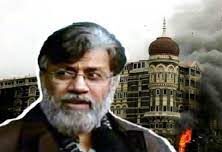With the Mumbai police having submitted a chargesheet before a special court against Pakistani-origin Canadian businessman Tahawwur Rana for his involvement in the November 2008 Mumbai terror attacks, India has decided to expedite efforts to extradite the 26/11 plotter from the US. Diplomatic establishment here in New Delhi has already initiated a consultation with the experts and security officials in the Ministry of Home Affairs to plan the next move in this direction, The Daily Guardian has learnt from diplomatic sources. “Officials are exploring ways to expedite the process so as to ensure that Rana faces Indian judiciary for the crime he has committed,” sources aware of the high-level meeting told TDG.
“The set of fresh evidence that the Mumbai police officials have incorporated in the chargesheet would be quite important for the Indian side when it reaches out to the US for extradition of Rana,” sources said, adding, “Ministry of External Affairs (MEA) and Ministry of Home Affairs (MHA) will be holding several rounds of meetings in coming days to prepare a solid strategy in this regard.”
The officials are keeping in mind the two major developments in the US court in this regard. In what was seen as a major victory for Indian authorities, a US court in May this year had approved Rana’s extradition to India.
However, in August this year, a stay was ordered on the extradition of the Canadian businessman for facing trial in India for the 2008 Mumbai terror attacks. “The technical details of the two hearings in the US court have been scanned and examined during the meeting here, and a strategy to put India’s case across in a stronger way is being prepared accordingly,” officials said.
The over 400-page chargesheet, the fourth in the case so far, was submitted by the Mumbai police’s crime branch before the court’s registry on Monday. These pages will be closely studied and examined for inputs to already prepared files so as to make a water-tight case, said a source. “Again, the fresh evidence gathered by the Mumbai police against Rana are important which would help the Indian agencies to buttress their case in the US court,” officials pointed out.
“We got some fresh evidence against Rana in the form of statements and documents,” an official told a news agency.
In the Lok Sabha on 9 August, Union Home Minister Amit Shah had said that 26/11 Mumbai terror attack accused Tahawwur Rana will soon face the Indian judiciary.
This shows how much priority the Modi government is giving to this case in order to ensure that Rana is brought to India for prosecution and punishment. Ujjwal Nikam, special public prosecutor of the 26/11 Mumbai terror attack case, told a news agency on Monday that the Indian government has demanded extradition of Tahawwur Rana from America. He said, “Tahawwur committed the crime on American soil. Due to the extradition treaty between India and America, there will not be any difficulty in the extradition of Rana to India.
The argument given by Tahawwur Rana in the California court will not hold in the court.” Rana, currently under detention in the United States, faces multiple charges for his role in the Mumbai attacks and is known to be associated with Pakistani-American terrorist David Coleman Headley, one of the main conspirators of the 26/11 strikes.
A total of 166 people were killed when 10 terrorists from Pakistan arrived by sea route on November 26, 2008, and laid a more than 60-hour siege in the financial capital during which they targeted the city’s landmarks, a hospital and a Jewish centre, among others. Among the 10 terrorists was Ajmal Kasab, who was caught alive and later put on trial and sentenced to death by a special court.
He was hanged to death at Pune’s Yerawada central prison in November 2012, two years after being held guilty in the case by the court.







